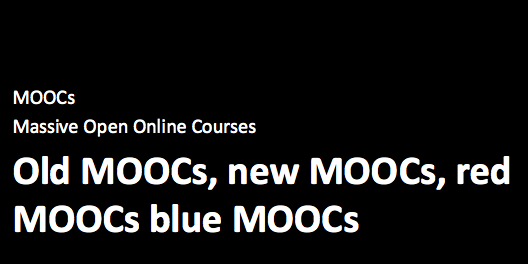 This talk by George Roberts was given at the annual Brooks Learning and Teaching Conference : “Testing the limits of university teaching: openness, assessment and collaboration”. This event was just on the heels of the First Steps into Learning and Teaching in Higher Education MOOC, so the questions posed by George were all fresh in our minds! The slides are here.
This talk by George Roberts was given at the annual Brooks Learning and Teaching Conference : “Testing the limits of university teaching: openness, assessment and collaboration”. This event was just on the heels of the First Steps into Learning and Teaching in Higher Education MOOC, so the questions posed by George were all fresh in our minds! The slides are here.
Abstract:
Among the practices which have emerged through the New Lecturers Programme in 2011-12, there are three that test the limits to online learning:
- massive open on-line courses (moocs),
- virtual conferences as a means of assessment, and
- distributed collaboration as a means of working in learning sets.
Taken together, these practices allow us to examine the role of the university and to re-imagine a place for institutions in a world where openness, access and community have come to underpin academic knowledge. Massive open online courses work for some, not all. Some participants are affected by a feeling of being lost. The development of autonomy benefits from scaffolding. The literal and metaphorical walled garden of the university, where openness is limited and access is controlled, even if only with the lightest of touches, provides a sense of security not present in a mooc. Virtual conferences challenge our understandings of academic literacy: we do not yet know how to “write the internet” in a way that makes us comfortable in the security of our knowledge. Text, and citation in text, reasserts itself vigorously through all the fissures opened up by multimedia discourse. And, learning sets are powerful motivators. They might well be supported through distributed collaborative approaches. But unless the extrinsic drivers are very powerful, the centripetal force of physical presence and trust engendered through face to face meetings overcomes the benefits of distributed collaboration.
All three practices: massive openness, multimedia academic discourse and distributed collaboration, will and should, I suggest, be part of academic practice. But, if implemented uncritically in pursuit of openness, access and community, these practices may undermine those very laudable aims.
